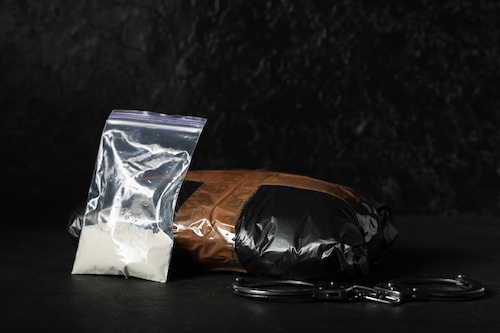Possession With Intent: What You Need to Know About Federal Drug Charges
At Cowboy Law Group, we defend clients with grit and integrity. We specialize in criminal and juvenile defense, including federal drug charges. Our attorneys work 24/7 to protect your rights, challenge government claims, and pursue the best possible outcome. We serve The Woodlands, Conroe, Houston, and surrounding communities with firm resolve and clear communication.
A possession with intent charge under federal law is one of the most serious drug offenses a person can face. It means prosecutors believe you not only had controlled substances but also planned to distribute drugs. Unlike simple possession, which may involve small amounts for personal use, this charge brings severe penalties, including long prison sentences and mandatory minimums.
Understanding how federal law defines, proves, and punishes possession with intent is essential for anyone facing drug charges or seeking help from a qualified federal drug charges attorney.
Legal Framework: Federal Controlled Substances Law
Federal law treats possession with intent as a serious offense under the Controlled Substances Act.
Statutory Basis
The Controlled Substances Act (CSA), under 21 U.S.C. § 841, makes it illegal to manufacture, distribute, or possess with intent to distribute a controlled substance. This statute applies to both actual possession and constructive possession of illegal drugs. The law also covers attempts and conspiracies under 21 U.S.C. § 846.
By contrast, simple possession under 21 U.S.C. § 844 applies when the person holds drugs for personal use only. This lesser offense usually carries a lighter penalty and does not require proof that the defendant intended to distribute the controlled substance.
Schedules of Controlled Substances
The CSA divides drugs into five schedules based on their medical use and potential for abuse. Schedule I includes drugs like heroin, LSD, and marijuana, which have a high risk of abuse and no accepted medical use. Schedule II includes substances such as cocaine and methamphetamine. Schedule III, IV, and V cover prescription drugs with decreasing levels of control.
The particular controlled substance involved in a case determines the severity of the drug charges. Penalties depend on the drug involved, its schedule, and the quantity found.
Distribution and Trafficking Penalties
The court may impose a mandatory minimum sentence when the quantity of the substance involved exceeds a set threshold. Larger amounts of narcotics or illegal drugs increase penalties, often leading to years of jail time or a long prison sentence.
The statute also defines the maximum sentence for distributing or possessing drugs with intent to distribute. Factors such as prior convictions, use of a weapon, or distribution in a school zone can trigger enhanced penalties.
Key Legal Terms
Federal law uses specific language to define offenses.
- Distribute means to deliver or transfer a controlled substance.
- Manufacture covers production or preparation of a drug.
- Possession includes both actual possession and constructive possession where control or access to the drugs exists.
- Intent to distribute refers to the plan or purpose to sell or share the drugs, proven through evidence like packaging materials, scales, or large sums of cash.
Understanding these terms helps clarify the line between personal use and intent to distribute. Anyone facing such allegations should seek help from a federal drug charges lawyer who can assess the evidence and explain possible legal options.
What Does “Possession With Intent” Actually Mean?
Federal prosecutors must prove more than simple possession of a controlled substance. They must show that the defendant intended to distribute drugs or share them with others.
Actual and Constructive Possession
Actual possession means the person physically holds the illegal drugs, such as having them in a pocket or bag. Constructive possession means the person controls the place where the drugs are found, such as a car, locker, or apartment. The law recognizes both forms as valid proof if the government can show knowledge and control.
The prosecution must establish that the defendant knowingly possessed the particular controlled substance. If the evidence shows the person was unaware of the substance involved, the charge may not stand. A federal drug charges attorney will often focus on whether the government can prove actual or constructive possession beyond a reasonable doubt.
Proving Intent to Distribute
To convict someone of possession with intent, the government must prove intent to distribute controlled substances, not just hold them for personal use. Intent can be shown through indirect evidence. Indicators often include the quantity of the drug, packaging materials, drug paraphernalia, or communications about sales.
If a person holds a small amount consistent with personal consumption, it is more likely to be treated as simple possession. When the amount is large or divided into smaller packages, prosecutors may argue the defendant intended to sell. The prosecuting attorney does not need proof of an actual transaction, only evidence that distribution was planned.
Evidence of Intent
Investigators may collect items that suggest drug transactions. These may include scales, plastic bags, large sums of cash, or notebooks recording sales. Text messages or phone records discussing illegal drugs can also strengthen the claim of intent.
The substance involved and its quantity are critical. Large quantities of cocaine, heroin, or methamphetamine typically trigger severe penalties and possible mandatory minimum sentences. A smaller amount may support an argument that the drugs were for personal use.
Reasonable Doubt and Defense
A federal drug charges lawyer will challenge the government’s interpretation of the evidence. The defense may argue that the accused possessed the drugs but did not plan to distribute them. They may also question how the drugs were found, whether others had access, or whether police violated search rules.
The government must prove the charge beyond a reasonable doubt. Any uncertainty about intent, possession, or the substance involved can reduce or dismiss the charge. Understanding how prosecutors interpret intent to distribute helps defendants and their legal teams prepare a strong defense.
Consequences of a Federal Possession With Intent Charge
A possession with intent conviction under federal law carries severe and lasting effects that go far beyond simple possession.
Penalties and Sentencing
Penalties depend on the particular controlled substance, the quantity of the drug involved, and the defendant’s criminal history. Large quantities of illegal drugs such as cocaine, heroin, or methamphetamine can trigger a mandatory minimum sentence ranging from five to ten years in federal prison.
The maximum sentence can reach 20 years or more, depending on the substance involved and any enhanced penalties. If death or serious injury results from distribution, or if the accused has prior drug possession charges, the punishment can include life imprisonment. A federal drug charges attorney can evaluate whether a case qualifies for such enhancements.
Factors That Increase Penalties
Certain factors increase punishment beyond the base offense. Prior felony drug convictions often double the minimum sentence. Carrying a firearm, distributing near a school zone, or involving minors can also add years to a prison sentence.
Possessing large amounts of a particular drug or using packaging materials associated with sales can push the charge into a higher penalty range. The prosecuting attorney uses these facts to show that the defendant acted as a distributor rather than for personal use.
Comparison to Simple Possession
Federal law treats simple possession as a lesser offense, usually a misdemeanor punishable by up to one year in jail. By contrast, possession with intent under § 841(b) is a felony that can result in years of jail time, probation, and large fines.
A small amount of a controlled substance may support a personal use claim, while a large quantity or evidence of drug transactions can lead to drug charges for distribution. Understanding this difference is critical for anyone facing drug charges.
Collateral Consequences
A conviction for possession with intent affects more than just prison time. It can lead to forfeiture of property under 21 U.S.C. § 853, loss of federal benefits, and permanent damage to employment or immigration status. Many states also impose restrictions on housing and voting rights after a federal conviction.
These penalties highlight why immediate legal representation is essential. A federal drug charges lawyer can work to reduce charges, challenge enhancements, or argue for a sentence below the guideline range.
The Importance of Legal Defense
Federal judges must follow strict sentencing guidelines but can consider mitigating factors when presented effectively. A skilled federal drug charges attorney can argue for reduced penalties by showing lack of prior record, minimal involvement, or evidence that the defendant intended the drugs for personal use.
The outcome depends on how well the defense challenges the government’s evidence. A clear understanding of the potential penalties helps defendants make informed choices about pleas, cooperation, and trial strategy.
Consult With an Experienced Federal Drug Charges Attorney ASAP!
If you are facing drug charges for possession with intent, the stakes are high and every decision matters. The federal system is strict, and prosecutors will use every piece of evidence to build their case. Our team at Cowboy Law Group understands federal drug laws and how to challenge the government’s claims.
Contact us at 832-326-2932 for a free claim review today!







